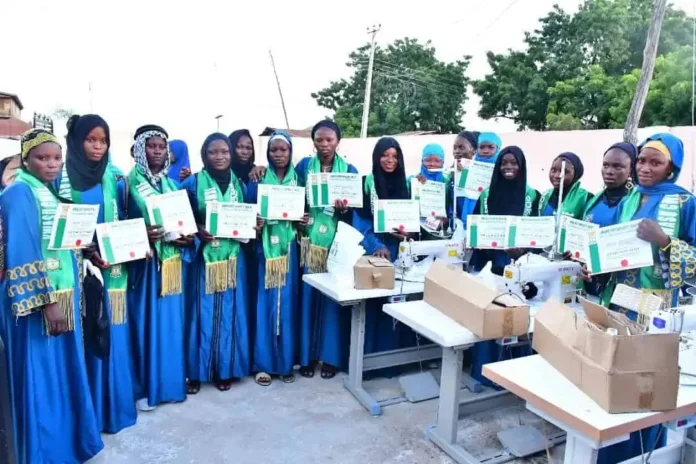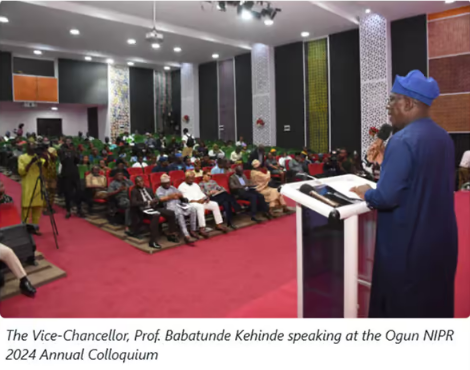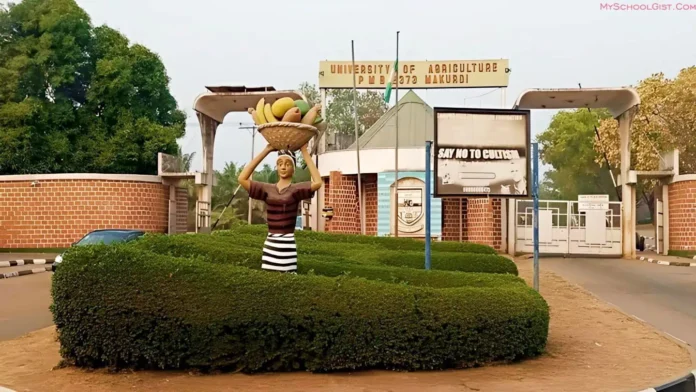The Federal University of Agriculture, Abeokuta (FUNAAB), is urging a collective approach to overcome the challenges hindering Nigeria’s efforts to meet the United Nations’ Sustainable Development Goals (SDGs), especially in ending hunger and ensuring food security.
Vice-Chancellor Professor Babatunde Kehinde has called for collaboration among public and private stakeholders to tackle the food crisis and support Nigeria’s agricultural future.
This appeal was made during the 2024 Annual Colloquium of the Nigerian Institute of Public Relations (NIPR), Ogun State Chapter, which was themed “Galvanising Public and Private Stakeholders Toward Addressing Food Crisis in Nigeria: Public Relations as Key Driver”.
Table of contents
- Public Relations as a Tool for Addressing Food Crisis
- FUNAAB’s Agricultural Achievements and Initiatives
- Addressing Misconceptions About FUNAAB’s Role
- Call for Action and Collaboration
- Contributions from Ogun State Government and NIPR
- Focus on Sustainable Agricultural Practices
- Awards and Recognition at the Colloquium
Speaking at the event held on October 3, 2024, at the June 12 Cultural Centre in Abeokuta, Professor Kehinde commended NIPR for keeping food security in the public eye.
He highlighted the need for unity among academia, government, and private industry to solve the food crisis.
He stressed that strategic Public Relations can drive collaboration between sectors and help secure a better agricultural future for Nigeria.
Professor Kehinde emphasised that the role of Public Relations and the media is crucial in building partnerships to combat food insecurity.
He noted FUNAAB’s leadership in agriculture, citing the recent Memorandum of Understanding (MoU) with Nourished Choice Foods Ltd., which focuses on reducing food costs and boosting production.
Under his leadership, FUNAAB has gained a strong reputation for academic excellence and agricultural contributions.
FUNAAB’s Agricultural Achievements and Initiatives
Professor Kehinde also highlighted some recent agricultural achievements of FUNAAB.
The ongoing harvest of a 2-hectare tomato farm managed by students under the Centre for Community-Based Farming Scheme (COBFAS) is one of the key projects.
The university has also established a 22-hectare Cassava Bio-Ethanol Farm and recently completed a 9-hectare maize farm project in partnership with NOLAP.
These initiatives reflect FUNAAB’s commitment to solving food insecurity through research and collaborative projects.
Addressing Misconceptions About FUNAAB’s Role
Professor Kehinde clarified the role of FUNAAB, stating that the university’s main goal is not to feed the nation directly.
Instead, FUNAAB aims to equip students with the knowledge and skills needed to make a meaningful impact in agriculture.
He proudly mentioned FUNAAB’s recent recognition as the Best University of Agriculture in Africa and the 7th best globally, along with being ranked 1st in Nigeria for the United Nations Sustainable Development Goal (SDG2) – “Zero Hunger”.
Call for Action and Collaboration
The Vice-Chancellor also stressed the importance of reshaping the narrative around agriculture and celebrating successes.
He believes that, with the help of Public Relations, along with government and private sector efforts, Nigeria can build a sustainable agricultural future.
Contributions from Ogun State Government and NIPR
Ogun State Governor, Prince Dapo Abiodun, represented by the Commissioner for Agriculture and Food Security, Hon. Bolu Owotomo, highlighted the challenges of food insecurity in Nigeria.
Hon. Owotomo pointed out that addressing these issues requires more than government efforts; it needs the active involvement of both public and private sectors.
He emphasised the need for innovation in the agricultural sector and urged professionals to help change public perception, making agriculture an attractive and profitable career.
Hon. Owotomo encouraged all stakeholders to share success stories, as these positive narratives are key to overcoming food insecurity.
Focus on Sustainable Agricultural Practices
Dr. Ike Neliaku, the President of NIPR, represented by Mr. Tope Adaramola, called for greater attention to mechanised farming and sustainable practices.
He urged Public Relations professionals to promote agriculture as a viable business opportunity.
Mrs. Oluwaseun Boye, NIPR Ogun Chapter Chairperson, also spoke, describing the colloquium as a call to action.
She urged participants to share ideas and engage deeply to help address the nation’s food crisis.
She also recognised the role of institutions like FUNAAB in advancing food production through research and education.
Awards and Recognition at the Colloquium
During the event, several awards were presented.
FUNAAB received an Award of Excellence for its Corporate Social Responsibility (CSR) efforts.
Governor Dapo Abiodun was also recognised for his support for food security in Ogun State.
The event concluded with the unveiling of the Image Maker Journal of the Institute.
The 2024 Annual Colloquium brought together experts from academia, Public Relations, and government to address food insecurity in Nigeria.
The gathering highlighted the crucial role of Public Relations in reshaping agricultural perspectives and fostering collaboration.







